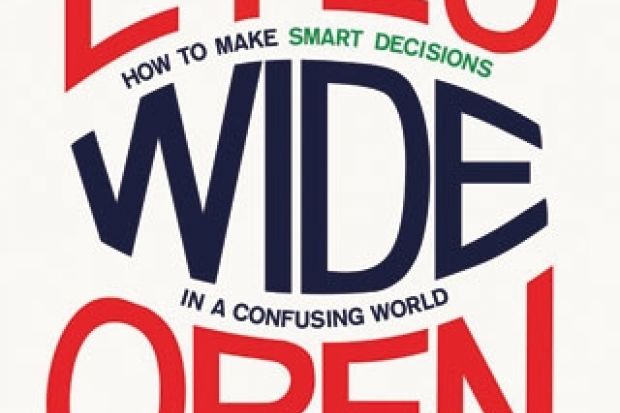This book’s blurb tells us that The Observer describes Noreena Hertz as “one of the world’s leading thinkers”. This is good. Then you learn that she is an economist. This is not good. Economists cannot agree on economics, so they obviously do not understand their own subject at the practical level, where it matters. Decision-making is considerably more important than economics; it is the central thread of life. It is also much better understood. Is an economist likely to enhance its clarity, or to muddy its waters? The beginning of Eyes Wide Open is written with such crystalline clarity that, not knowing Hertz, I took a bet with myself that she was educated at an English public school. I won – North London Collegiate. Declaration of interest: the school of my late mother, also a brilliant writer.
Hertz describes her own very unpleasant experience with a serious gastric problem. It baffled expert doctors. They subjected her to most known medical tests. Their recommendations spread from sugary to surgery, that is, from eating more sugar to the removal of her perfectly good gall bladder. Perhaps it was egregious medical decision-making that led an economist to study the flaws of the process. Ironic.
Decision-making has three components: information, intelligence and imperative. These components are the legs of a three-legged stool; if one fails, the decision fails
Hertz is obviously a formidable researcher. She gives a wide range of interesting and apposite examples. There are few surprises to those familiar with the subject, but many horror stories. In a simulated courtroom, the sentences passed by trainee judges correlated with the demands of hecklers. Priming or “nudge” issues are important but the real problems are the failures and corruptions of the system. Hertz urges you to look hard and cynically at supposed statistics: “8 out of 10 women would benefit from Whizzo Wrinkle Remover.” Which 10? A carefully selected 10 out of a population of a million, the rest of whom do not benefit? She also urges you to relate research results to the researchers’ own interests. Bad news warning: some studies that show that dark chocolate is good for you were sponsored by Mars Confectionery. More bad news: it is the flavonoids in chocolate that might be good for you, but most are removed because they are bitter.
Hertz’s catalogue is useful and interesting, but it remains a catalogue, a scoot across the surface of decision-making. She provides a fine tilth but she does not plant any ideas. Nor does she apply her obviously fine intellect to the investigation of the fascinating characteristics of decision-making, to the balancing of conflicting aims or to the downside that accompanies any upside. At its most elementary level, decision-making has three components: information, intelligence and imperative. Have you the information needed for an evidence-based decision? Have you the intelligence (ability or means) to process that information? And what imperative is driving your decision?
These three components are the legs of a three-legged stool; if one fails, the decision fails. The first raises the difficulty of where to stop digging; an excess of detail is impenetrable and counterproductive. The third component is the most overlooked of the three. Is your imperative to benefit your organisation, or your boss, or a chum, or yourself? Or is it to put the boot into some bastard who once sabotaged you? In the final analysis, the choice of imperative relies on the participant’s honour. When did you last hear that word? Not applied to those whose imperative is to look after themselves. Read the papers to identify them.
Hertz’s message is that commerce, the professions and politicians want something from you. So always ask, cui bono? It will certainly not be you. Have a nice day.
Eyes Wide Open: How to Make Smart Decisions in a Confusing World
By Noreena Hertz
William Collins, 344pp, £14.99 and £7.49
ISBN 9780007467105 and 7467112 (e-book)
Published 12 September 2013





